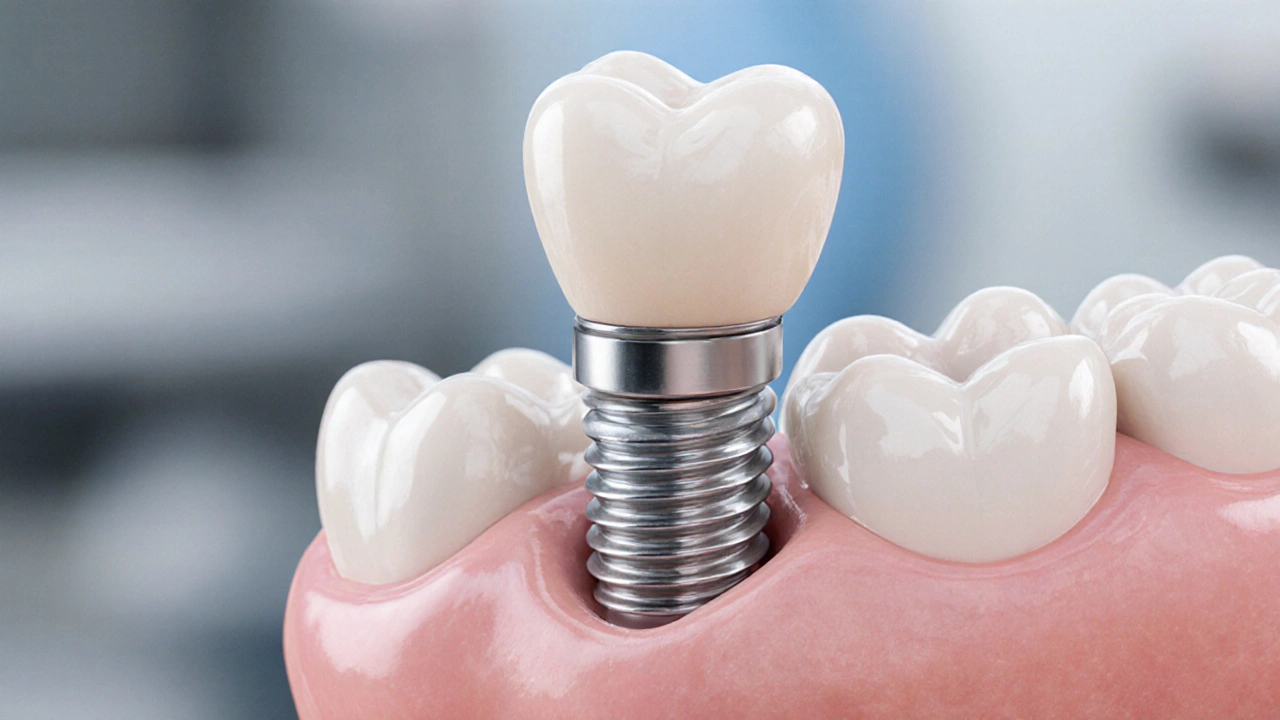Dental Implants – What You Really Need to Know
Thinking about getting a dental implant? You’re not alone. Millions search for a sturdy, natural‑looking tooth replacement, but the hype can hide the hard stuff – price, pain, and who’s actually a good fit. This guide pulls back the curtain, so you can decide whether an implant makes sense for you.
How Much Do Implants Really Cost?
In the UK a single implant can run from £1,500 to £3,000, depending on the brand, the dentist’s skill, and any extra labs or scans. A full‑arch replacement can top £20,000. That’s why many people hunt for cheaper options in Europe or look for NHS‑linked schemes. The biggest price drivers are the surgical step (the drilling), the crown material, and after‑care visits.
If you’re on a tight budget, ask your dentist about phased treatment (placing one implant at a time) or whether a titanium‑free alternative could lower costs. Some clinics also offer payment plans that spread the fee over 12‑24 months.
What About Pain and Sedation?
Most patients describe implant surgery as “moderate discomfort” rather than outright pain. Local anaesthetic does the heavy lifting, and you stay awake. If you’re nervous, options like nitrous oxide or oral sedation are common in the UK. Full‑sleep (IV) sedation is rare and usually reserved for complex cases.
After the procedure, you might feel sore for a few days. Over‑the‑counter painkillers and ice packs usually keep it manageable. Following the dentist’s after‑care instructions (soft foods, gentle brushing) speeds up healing.
Age Limits and Health Restrictions
Age alone isn’t a deal‑breaker. People in their 70s get implants all the time, as long as bone density is sufficient and they’re in good overall health. Chronic conditions like uncontrolled diabetes, heavy smoking, or a lack of enough jawbone can make implants riskier.
If you have a thin jaw, a bone‑graft may be needed before the implant can be placed. That adds time and cost but improves long‑term success.
Who Should Skip Implants?
Not everyone qualifies. Heavy smokers, those on bisphosphonate medication, or anyone with active gum disease should explore alternatives first. Bridges, dentures, or mini‑implants might be safer choices.
Dental implants also demand good oral hygiene. If you can’t commit to regular brushing and flossing, the implant could fail early.
Finding Affordable Care
Look for clinics that publish transparent pricing and allow you to see a treatment plan before any work starts. Dental tourism can be tempting, but make sure the overseas provider follows the same sterilisation standards you’d expect at home.
For UK residents with limited funds, charities, university dental schools, and certain NHS trusts sometimes run low‑cost implant programmes. It’s worth a quick phone call to ask about eligibility.
Bottom line: dental implants can restore confidence and function, but they’re not a one‑size‑fits‑all solution. We’ve covered the big questions – cost, pain, age, risks, and alternatives – so you can talk to your dentist with the right facts in hand.
Can I Get My Teeth Fixed for Free in the UK?
Can you get your teeth fixed for free in the UK? The NHS covers essential treatments like extractions and dentures - but not implants unless there's a serious medical need. Learn what's covered, who qualifies, and affordable alternatives.
Cheapest Way to Fix Messed Up Teeth in 2025
The cheapest way to fix messed up teeth in the UK isn't implants-it's dentures or bridges. Learn affordable, proven options that work without breaking the bank.
Cheaper Alternatives to Dental Implants in the UK
Looking for cheaper alternatives to dental implants in the UK? Discover affordable options like dental bridges, dentures, and adhesive solutions that restore your smile without the high cost.
How Long Do Dental Implants Last? Lifespan, Care & Costs Explained
Discover how long dental implants truly last, the factors that affect their lifespan, and practical tips to keep them healthy for decades.
Dental Implants: Downsides, Risks, and Realities You Never Hear About
Explore the lesser-known downsides of dental implants, including risks, hidden costs, and possible complications so you can make a fully informed decision.
What Age Is Too Old for Dental Implants? The Full Truth About Dental Implant Age Limits
Curious if you're too old for dental implants? Find out the real age limits, biggest risks, and why age often isn't the deal-breaker you think it is.
Who Should Avoid Dental Implants? Risks, Limitations, and Safer Alternatives Explained
Dental implants aren’t for everyone. Find clear guidance, facts, and alternatives if you’re considering – or warned against – dental implant surgery.
Dental Implants UK: How Much Pain to Expect and What Helps
Wondering how painful dental implants in the UK actually are? Get real facts, practical tips, and honest advice about pain levels and the full recovery journey.
How to Get Free Dental Care in the US: No-Nonsense Guide
Millions of Americans skip the dentist because of the high prices, but there are actually ways to get quality dental care for free or at a big discount. This article breaks down how to find free dental clinics, programs, and resources—even if you don’t have insurance or much money. You’ll also learn about organizations that cover procedures like cleaning, fillings, and sometimes even implants. Real stories, actionable tips, and insider hacks make this guide essential reading for anyone looking to save on dental bills. You don’t have to sacrifice your smile just because your wallet’s light.
Cheapest Place for Dental Implants in Europe: Real Costs and Insider Tips
Thinking about dental implants but worried about the price tag? This article breaks down where you can actually get the cheapest dental implants in Europe, with real numbers and handy tips. We compare costs in popular countries, spotlight what to watch out for, and share real advice for UK patients. You'll also learn why 'cheap' doesn’t always mean better and how to make the smartest choice when travelling for dental work.
Dental Implants UK: Do You Have to Go Without Teeth While Waiting?
Worried about having gaps in your smile while waiting for dental implants? Many people think they’ll have to hide their teeth while healing, but that’s rarely the case. Temporary solutions like dentures or bridges can fill the gap until your permanent implant is ready. This article explores what you can expect, which options are available, and what the process looks like in the UK. Find out how you can keep smiling confidently while your implant journey is underway.
Dental Implants UK: What to Do If Your Teeth Are Rotting and You Can't Afford to Fix It
Struggling with rotting teeth but don't have the cash to fix them in the UK? This guide breaks down your options, from NHS resources to practical ways to prevent things getting worse. Find tips on affordable fixes, managing pain, and what really happens if you leave dental problems unchecked. Get the facts you actually need—without the sugarcoating.












